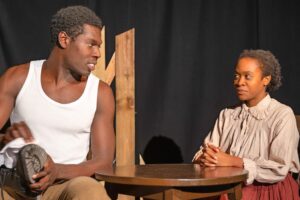The story of the black British soldiers who fought in World War I is little known and the race riots that took place in 1919 are largely forgotten. Charlotte Green talks about her work to explore what happened – something she and her co-writer Rasheka Christie-Carter will discuss as part of Army@TheVirtualFringe.
The idea for Lest We Forget came to me while on tour as an actor in France and Germany in 2017 driving past many sites of huge battles in World War One.

Here thousands of people had lost their lives and yet we were driving past listening to French pop songs on the radio without a care in the world.
The centenary was a year away and I wanted to write something to commemorate it.

Driving along I began to think of my friends and who – one hundred years ago in 1917 – would have been fighting in the muddy fields, watching their comrades die or making the ultimate sacrifice themselves.
I wanted to remember and pay homage to them in the only way I could – through theatre. I have seen plenty of plays about World One War which usually consist of white British men in a bunker but the people I know aren’t just white British and they aren’t just men, where are their stories I wondered?
After some research I found out about men coming to fight from the Caribbean but there was hardly any stories of black British soldiers. As ethnicity wasn’t recorded in World War One, one of the best ways to track the involvement of black British soldiers is through photographs.
As more in depth research was carried out, characters developed, stories emerged and William James, our protagonist was born. A fictional character but with very real stories and facts woven into his narrative.
After writing the play and gaining Arts Council funding Home Truths Theatre held a research and development project in November 2018 and then performed the full length piece in November 2019 at Greenwich Theatre Studio.
From there we joined Army@TheFringe and although we can’t be in Edinburgh next month we are so excited to perform online.

For this showing I have been working with co-writer Rasheka Christie-Carter on shortening the piece to one hour and bringing our themes of race, identity and patriotism to the fore.

Rasheka believes this story is important as “it gives an insight into a part of history in Britain that no one really knows a lot about. Also, I think a lot of people think that Black British-ness started at Windrush but Black people have been here for 100 hundreds of years”.
We both hope that the audience will see the differences and unfortunately the similarities in regards to racism in Britain today. Have we really come that far in 100 years and how much work is there left to do on the fight for equality?
- Find out more at www.armyatthefringe.org.

































